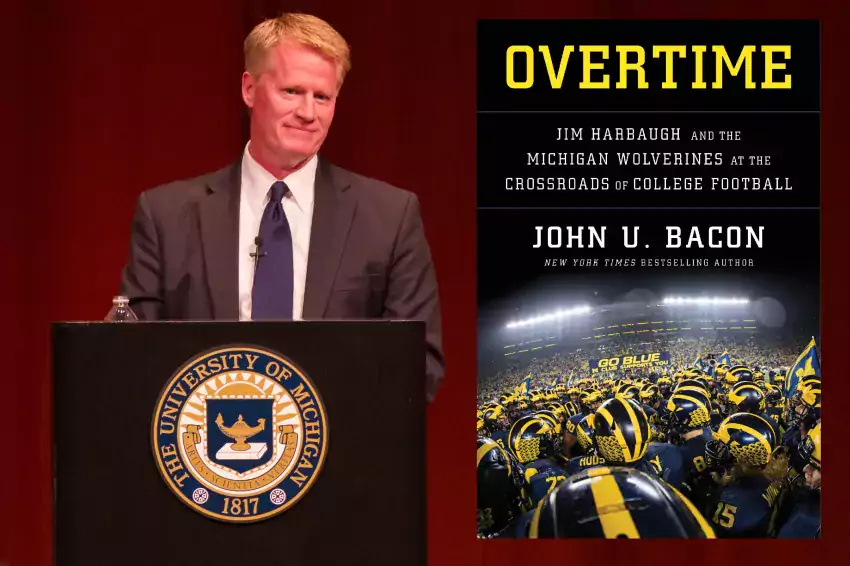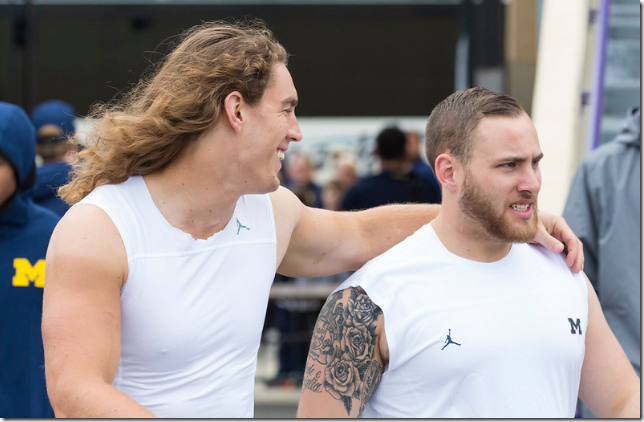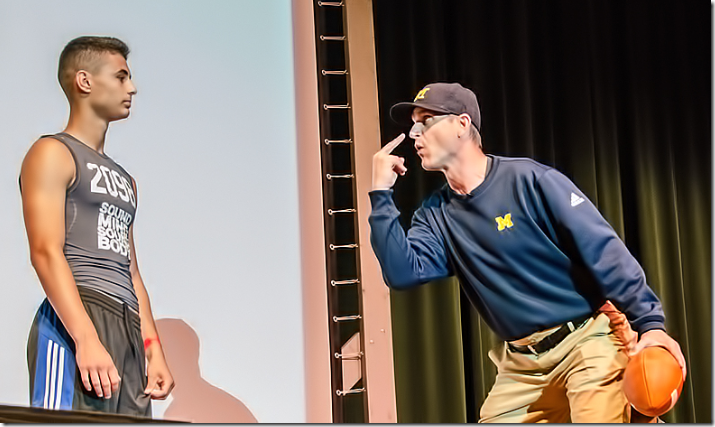
On the Other Side of Ralph: A Review of 'Overtime' by John U. Bacon

As you might have heard, there is a new John U. Bacon Michigan book today. This one's full title: OVERTIME: Jim Harbaugh and the Michigan Wolverines at the Crossroads of College Football. If you want it, you can start at Bacon's website, or you can come down to Hill Auditorium tonight for the event hosted by Literati, ask your questions to the man himself, and get a signed version.

FULL DISCLOSURE: Bacon's publisher is advertising this book on this here site, and I make my living by selling the advertising on this site. They're not paying me to write a review, and I had most of this review written before they offered. I think if you compare this review to Brandon's Lasting Lessons, you'll be able to gauge how much bias crept in. Anyway, you're a Michigan fan and you read this site, so the rest of this is superfluous: you've known you're going to start it tonight since you heard about it.
--------------------------------------------
Revelations
I heard about it early. I was trying to pitch Bacon on writing an article for Hail to the Victors 2018 called “Recruiting Harbaugh,” paralleling Michigan’s pursuit of the young quarterback in 1981-‘82 with that of its savior head coach in 2014—”You know, like Godfather II.” Bacon kindly explained his publisher had other ideas for a Harbaugh story contrasting the rise of the Comeback Kid with the administration of the family operation he rescued.
As with previous books, Bacon spent a year embedded in the program, catching stories you wouldn't believe, and a lot more you suspected. Coming off the Brandon one, I can see why reviewers and excerptionists would prefer to focus on the few compact tales of cartoonish villainy and incompetence. A barrage of "I can't believe he actually…" stories were a feature of Endzone because they were a feature of the man in charge of things. In Overtime, the ol' rogues gallery provides enough to keep things spicy and tickle some confirmation biases, but focusing on the controversies is antithetical to the story being told. My friends will be happy to know the Michigan Man™ stuff isn’t as belabored as the tweets make it seem.
[After the JUMP: A sequel to someone’s lasting lessons]
By now you've probably tried one of the free samples, or at least come across one of the revelations therein. We got first dibs, and ran the stuff about Michigan State's enterprise-wide pettiness, and the Michigan players' response to it. Another site got the high of rolling Penn State. Another ran the incredible conclusion to Dax Hill’s recruitment, where Harbaugh says "It's hard to beat the cheaters," and that site played it for maximum hits from SEC fans demanding proof there's gambling in this establishment. The story about some MSU coaches going full elementary school bully on Sarah Harbaugh after the 2015 game—that's out there. If you're buying this to see the dirty player-payers and dirty players of dirty players called out, eh, the excerpts cover most of it, and you’re missing the point.Overtime isn’t about the ideology so much as the nuts and bolts application of many ideologies in a large organization. This is not a sequel to Endzone; it’s a case study for incorporating Bo’s Lasting Lessons to the vastly changed landscape of half a century later.
The Hours
[Patrick Barron]
The story being told is that of a modern football program that's working, through the prism of Michigan's 2018 season. Bacon followed stars, role players, and walk-ons, coaches, parents, and directors of various football operations. The games—usually told from the players’ perspectives—are described, but overwhelmed by the other 8700 hours of the year put into them, the 67 full-time staffers devoted to the 120-odd players, and everybody’s habits. I doubt many companies have ever had their operations—how they affect their personnel, and vice-versa—examined so thoroughly. It's certainly the deepest Bacon's ever gone into Michigan football, and the first to really encompass the scale of the institution we're talking about.
Of course he follows the man, tracking Harbaugh from his father’s youth, through Jim’s entire career in football. In the course of your Michigan fandom you're bound to have heard something about how Harbaugh is wired differently than most people. Triangulating from those who knew Harbaugh as a child and onward, Bacon constructs an image of an inexorable torrent of competitiveness shaped by exceptional channeling.
In his life story the benefits of this game are most clear: football was made to solve problems like Jimmy Harbaugh. There’s some understanding, acknowledged by several characters, that young Jimmy’s problems are hardly exclusive to Jimmy. The structure, long-term goals, and ability to operate complex functions as part of a large and fast-moving organization that define football don’t have to be “What youth need today,” to remain extremely valuable for some youth.
As experienced Bacon readers well know, the author is a master at condensing information. Like the guys cutting up hours and hours of film for Michigan’s coaches, and the coaches who spend 40 hours a week reviewing that film, Bacon begins with a library of interviews. Those that make it pull double duty, proving the chapter’s hypothesis and referencing something else. When you meet a Matt Dudek or Grant Newsome, it’s never without a callback to the book’s main theme of football’s worthiness of its incredible cost. Quotes do the heavy lifting, especially when it’s going to be controversial. Bacon never says the SEC doesn’t take academics seriously, but Deb Bredeson will recall Ben ruling out Tennessee when he saw a 2.5 GPA gets you on their “Academic Wall of Fame.”
We made fun of Bacon on the live podcast last week for titling himself into a corner (What's the next book: Extra Point?), but if you haven’t guessed, “Overtime” is a reference to the working hours in Schembechler Hall. Old Bo assistants like Jack Harbaugh will recount how they rarely got to spend more than the bare minimum of sleeping hours at home; at today's Michigan that goes for the nutritionist, the academic staff, the players, certainly, plus a murder of videographers.
One of the first important moments sees players recommend staff changes to Harbaugh; this nets Ben Herbert and nutritionist Abigail O'Connor, whose job is not just to plan what the players eat but make sure they'll want to eat it. And you see how it all fits together. When you dive down into nutrition, you follow a player out of that into the new weight room with its multi-floor treadmill and Herbert's scientific approach. That leads to academic advisor Claiborne Green (who's also the caretaker of The Banner), and here you’ll find Rashan Gary as his support system breaks through his dyslexia to free the A student it was holding back, and meet his mom who used football as the carrot to motivate her son through that arduous process, and this just goes to show…
Everybody is going full-throttle, and in the same direction, trusted in their areas of expertise, informed by the boss's philosophies, but not trapped by them. It's fascinating to see all the small decisions being made, and how rapidly something gets thrown aside if it's not working, even (especially) Harbaugh things. Business leaders should take note of how information flows to management, and the extremely inclusionary process tree, a marked contrast to the top-down management style under Brandon. Winter conditioning used to be lifting on Mondays, Wednesdays, and Fridays, with competitions Tuesdays and Thursdays. Winovich informed his head coach that players were saving it for the competition days, and practices changed.
That’s why I think this book fits better with Bo’s Lasting Lessons. You see a lot of the old general in the picture Bacon paints—not Bob Ufer’s Pattonesque caricature of his hero, but the complex leader Bacon came to know—the one with rigid morals, a trickster’s psychological subtlety, and a management approach built on the premise that your people are good and you ought to trust them. Except Schembechler’s program never spent $1 million per player.
Questions
[Bill Rapai]
The question Bacon's answering is the one purportedly closest to Harbaugh's heart: Is football worth it?
The “it” part of that question is where this book really excels. Even after years of writing about this program I had only the barest sense of how much “it” there is. The extent of Michigan’s football operations today is what you might expect from a mid-sized nation’s military. The justifications are found along the way—as fans we don't have to be convinced as much—but mostly it’s about what those who do it get out of it.
There's a moment in the book—one I can brag that I was present for—when Harbaugh tells the story of facing “Ralph” in his first Oklahoma drill to a banquet of Michigan high school coaches. Everybody in the room immediately knows Ralph, the 6th grader who shaves, wears clothes larger than your dad's, and is still in the same spot in the opposite line as you no matter how many times you count. Narratively, it wraps up the Harbaugh thread the way the birthday scene in Godfather II puts a bow on Vito Corleone's. Football's lived a hard life, done some awful things along the way, built a house on the hill that rains glory and financial well-being on those around it. It deserves that 150th birthday cake.
It’s also understood that we know the score here. Coppola contrasts the young idealistic Michael stewing apart from his hypocritical family with elderly Michael stewing in the loneliness of power.
This brings me to my one big critique of Overtime. It answers one question, but begs two. The second is why can’t we take the family legitimate? Michigan is pouring incalculable resources into a first-rate football production. It’s the only way to follow the NCAA’s Byzantine rules and embody the high-minded scholastic ideals that you’re not supposed to care about beyond the legal justification for hoarding the billions. Paying this stuff more than lip service, e.g. when a donor buys the whole team an educational trip to Europe or South Africa, brings blowback from the grifters. That’s understandable since few programs have access to the kind of money Michigan uses to money-cannon away the game’s systemic issues. It doesn’t address the systemic issues.
Bacon's answer, as it was in Fourth and Long, is to enforce the old middle 20th century version of the rules so well that those who want to be paid are squeezed into a minor league—see: Canadian junior hockey. I find this infeasible. In college football, if you were to pull Tosh Lupoi’s finances, boot every player his oversized contract is paying under the table, and tell them to go play for the Tuscaloosa Timberlands, the Tide would simply find another way to funnel an undersized portion of the money to the guys most visibly earning it. Since change isn’t going to come from inside, it’s rather hopeless to dwell on it. I’m guessing The Lawsuit will come in our lifetimes, and that will change everything, not all of it for the better.
In the meantime, this answers a third question that wasn’t asked: Isn’t this what you wanted? You read this book with full knowledge of what comes at the end. It was cathartic, I think, to relive the happy moments forgotten about in the aftermath of the Great Deflation. Condensing an entire season into the Ohio State game is a trap none of us can avoid. A new perspective on it—the moment the players themselves realized they don’t have it—was surprisingly helpful to my own psychological well-being. It let me zoom out, take in the entirety of the program and its trajectory under Jim Harbaugh, and recognize that it’s no different from the one my dad grumbled about for the breadth of the 1980s. Personally, I find some of the sanctimony unnecessary. But the point is that has to be taken in context with your appreciation for things nobody else has. Bama would never let a real chronicler near their secrets. Michigan State’s whole thing is they don’t let you in the building if you can’t follow the script. Michigan fans get a New York Times bestselling author inside the operation.
September 4th, 2019 at 10:24 AM ^
I am amaized that there is just one review on Amazon and it's equivocal (***).
September 4th, 2019 at 3:35 PM ^
Read "Overtime" yesterday. Very satisfying. Go Blue!
September 5th, 2019 at 11:44 AM ^
Good read so far- great insight to football in general as far as personnel and what it takes to run a university program- all the hours that go into keeping the program on top, healthy and doing things correctly. The behind the scenes stuff is fascinating and things you don't see come game day.


Comments